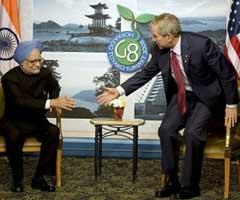|
|
 |
Bush, Singh Talk Nuclear
 |
6:12am, Jul 9th 2008
Blog viewed 1680 times
|
|
|

US President George W. Bush and Indian Prime Minister Manmohan Singh on Wednesday discussed an embattled nuclear accord that has drawn fire in both countries and fractured Singh's government.
"We talked about the India-US nuclear deal, and how important that is for our respective countries," Bush said after fresh White House warnings that time is running out to ratify the pact before he leaves office in January.
Singh and Bush in 2005 unveiled the agreement to share civilian nuclear technology, which would see India enter the fold of global nuclear commerce after being shut out for decades.
But Singh faces intense domestic opposition over fears it could draw India too close to the United States, a concern that Tuesday prompted a bloc of left-wing parties to announce they were quitting his coalition.
Singh did not spell out whether he would submit the accord for ratification but emphasised the need for US-Indian cooperation on issues like climate change and helping the sputtering global economy.
"India and the United States must stand tall, stand shoulder-to-shoulder, and that's what is going to happen," he said.
In a harsh message apparently aimed at critics of warmer US-India ties, Singh said closer cooperation on key global issues was "the will of the Indian people, particularly the thinking segments of our population."
But it was unclear from the prime minister's public remarks whether he would push ahead with ratification, a key US goal that is growing more urgent with around 200 days left before Bush steps down in January 2009.
"I respect the prime minister a lot, and I also respect India a lot and I think it's very important that the United States continues to work with our friends to develop not only a new strategic relationship, but a relationship that addresses some of the world's problems," said the US president.
He cited the need "to grow our economies and at the same time be responsible stewards of the environment," revive the Doha round of global free trade talks, and promote bilateral educational exchanges.
Singh also painted a sunny picture of US-Indian ties, declaring: "I am very pleased with the state of our relationship, which has truly acquired the characteristic of a genuine strategic partnership."
"Our relationship with the United States has never been in such good shape as it is today," Singh said. "We have progressed in nuclear cooperation, space cooperation, defence cooperation, educational exchanges."
Singh argues the nuclear pact is crucial for energy security and to sustain high economic growth. The country currently imports more than 70 percent of its energy needs, and needs an overhaul of its decrepit nuclear energy sector.
The bloc that has said it is withdrawing support from the coalition government, which has 59 seats in India's 545-member parliament, also believes that allowing UN inspections of the country's civil nuclear programme - as demanded by the Americans - would harm India's strategic weapons programme.
But Singh's administration is seen as unlikely to collapse thanks to a deal struck last week with a regional socialist party.
New Delhi also has to win a waiver from the Nuclear Suppliers Group to conduct atomic commerce and clinch a pact with the International Atomic Energy Agency allowing international inspections of its civilian nuclear reactors. |
|
|
|
|
|